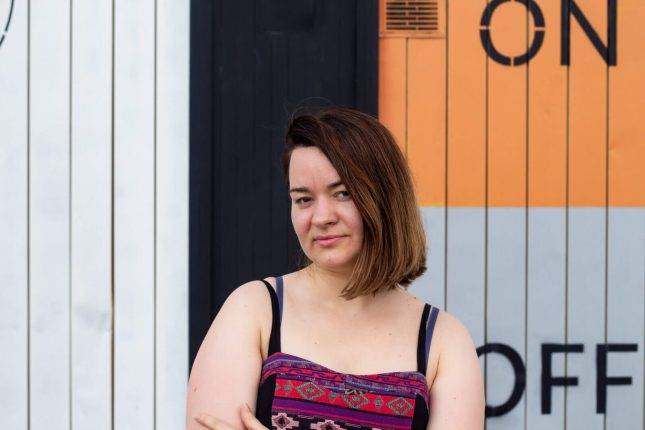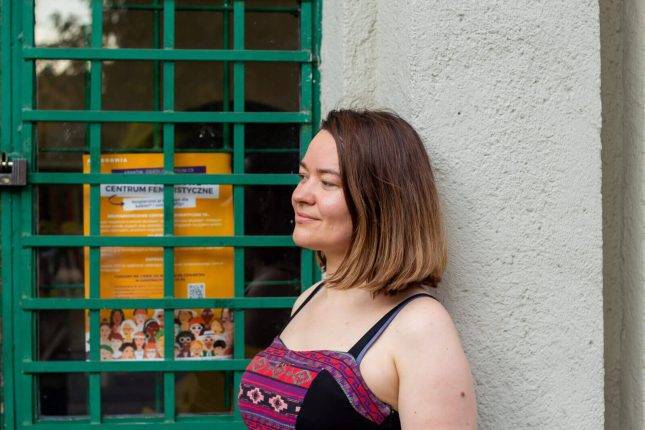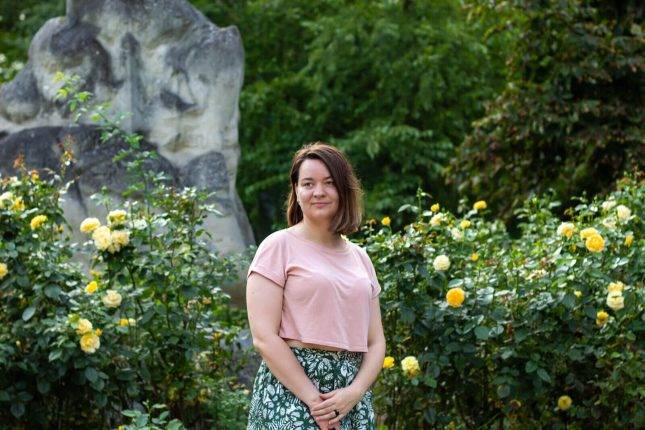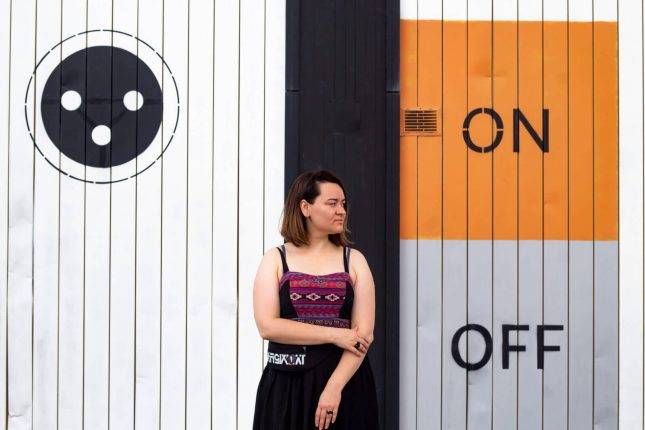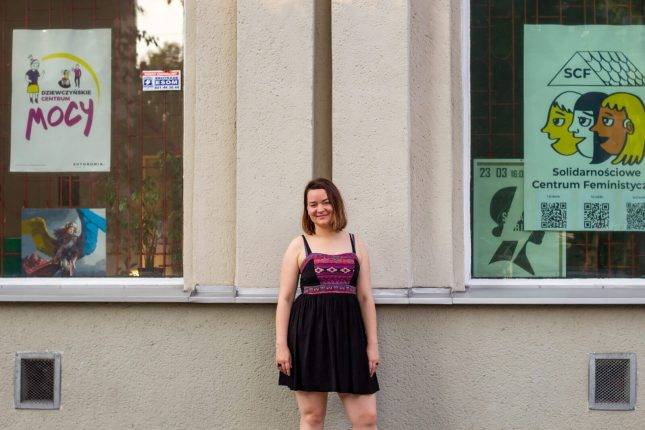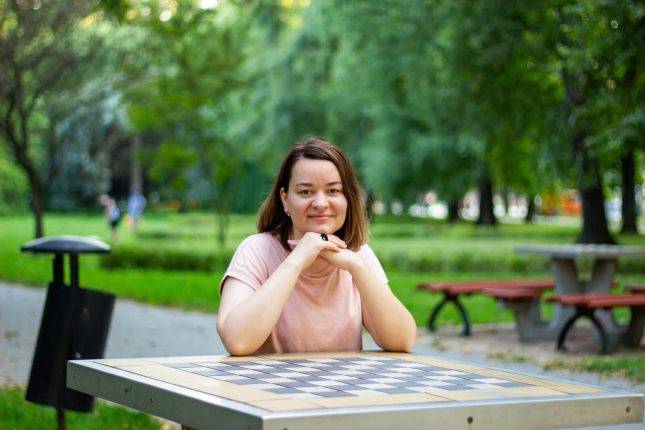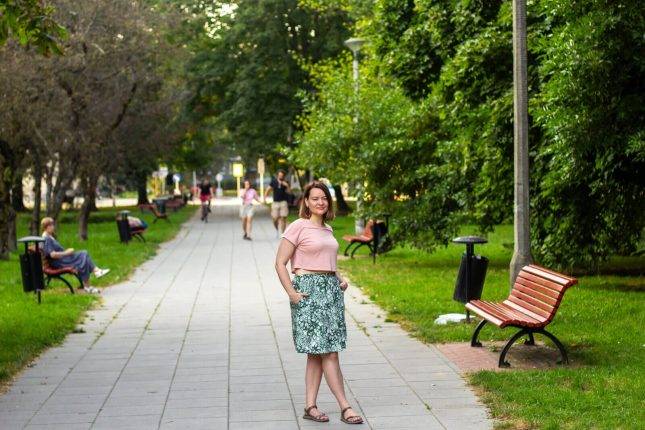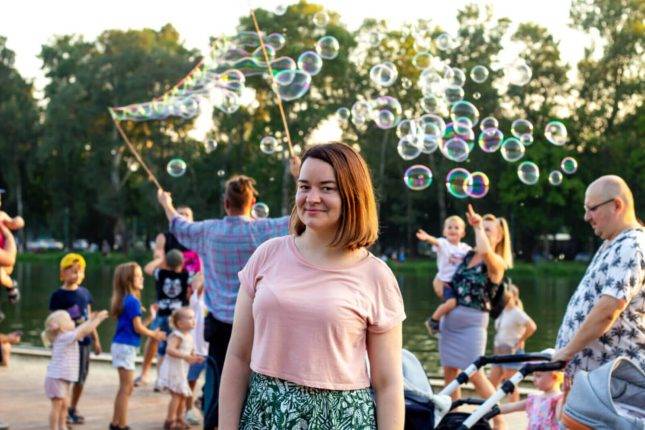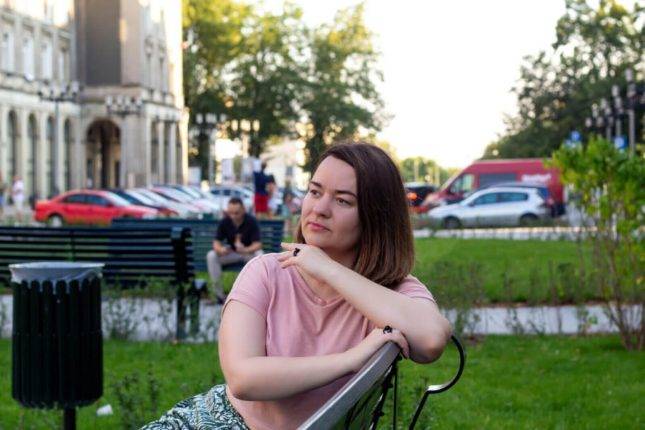
Releasing the demons: the Belarusian woman offering art therapy to heal the trauma for Ukrainians in Slovakia
23/10/2023
The suffering of children has been an important theme since day one of Russia’s full-scale invasion of Ukraine. For a year and a half now, Ukrainian children have woken up to air raid sirens, they have been killed and maimed almost every day by missiles. They are also learning to live in exile and survive the occupation – just like adults. Even those lucky enough to be alive and safe, with their families, remain deeply traumatised by what is happening. Olga Salakheeva, a Belarusian woman who has developed art therapy courses for Ukrainian refugee families in Žilina, Slovakia, spoke about her attempt to help these people.
‘Creativity and activism helped us survive psychologically in Belarus’
Olga Salakheeva is originally from Minsk. There, she spent many years building a career as a communications specialist, video artist, and cultural activist.
“There was an audiovisual duet: together with my partner, since 2010, we performed at festivals, mainly electronic music and techno. We organised some of the parties ourselves: we held two festivals of electronic music and media art, Mental Force, and many other events,” says Olga. “These were independent events for which we were good at finding support: the partners of our two-day festival in 2017, for example, were the Goethe Institute, the Krakow Unsound festival, the embassies of France and Poland. Celebrities also came to support us: Robert Henke, who plays in Monolake and created Ableton [a popular German software for musicians], Tariq Barri, who developed all the software for his performances himself, and others. We wanted to use foreign guests to draw the attention of our visitors to the equally interesting Belarusian artists.”
In contrast to her cultural activism, Olga jokingly calls her day job as a communications specialist “glamourous work”.
“I was engaged in communication activities in various NGOs and international organisations, worked with the delegation of the European Union – this is what I did for a living, a real profession,” Olga says.
“I was a national communications expert in the EU’s ‘Covenant of Mayors on Climate and Energy’, which was implemented by the Interaction Foundation. I also worked as a communications analyst in a project on the activities of the EU Delegation in Belarus, which was implemented by the Yzerin communications agency. And this, like creativity, helped me to survive psychologically in Belarus: to cope with constant pressure, with the awareness of the dictatorship around, the atmosphere of endless struggle and misunderstanding.”
At the end of 2021, the Interaction Foundation was liquidated, and the agency suspended its activities as all international projects in Belarus were frozen; free creative activities had become impossible even earlier. Olga was left bereft – financially and emotionally.
“I got the feeling that my work in Belarus was finished,” Olga says. “It was completely unclear where to go next. All I had left was art and the desire to continue communicating with people and helping them. And so, I didn’t completely lose heart: besides, around this time, in the late autumn of 2021, I had an agreement for a two-month art residency from the Ministry of Culture of Slovakia in the Slovak town of Žilina.”
But the artist was unable to get there right away. First, she got sick with coronavirus, then she spent long time collecting documents for a visa and for leaving Belarus, and then the war in Ukraine began.
“In April 2022, the COVID-19 restrictions were lifted and the entry regime into EU countries was simplified. Then I was finally able to go to Slovakia,” says Olga. “My art residency was not cancelled, though this could have been expected: after 24 February, many Belarusians began to receive refusals from their colleagues from Europe – refusals of grants, cancellations of joint events, or simply refusal to provide any support. But my art residency went through, with the invitation: ‘Everything is as agreed, we are waiting for you’. That’s how I ended up in Žilina. The city was flooded with refugees from Ukraine, you could feel it: in a city of 80,000 there were about 3,000 of them. Mostly women and children.”
‘Our task was to release the demons’
At the art residency, Olga Salakheeva was supposed to work on an individual project, but her plans changed almost immediately.
“It would be selfish to work on a project of your own when something like this is happening,” says Olga. “With my colleagues at the residency, Ukrainian and Slovak artists, we decided to combine our strengths and skills. To do what is more important – to help people who find themselves in such a situation. This is a crisis in which it is very important to help other through communication.”
This is how Olga’s master classes and art therapy for adults and children emerged: art classes designed to help overcome the psychological problems associated with war and being a refugee. Twelve classes, two times a week – always sold out.
“There were more children, but there were also enough adults,” says the artist. “In each lesson we tried to make art using different techniques, with a variety of materials. We also focused on the process, not the result: this is not an art academy where you need to create works professionally – it’s more about an atmosphere of trust and friendliness, which is good for both children and adults.”
Smiling, Olga recalls that it was more difficult to involve parents in the process, but it still worked:
“Adults still have the same insatiable inner child who wants to play, have fun, let off steam. Many think, ‘I’ve done my job in kindergarten and school, it is no longer for me’. And then they find themselves in the atmosphere of a master class, where what they started today can be finished the next day, using coloured crayons along with plasticine and pencils…. When people – both adults and children – get into a calm atmosphere, they just start to open up through art, they like it.”
The main obstacle that the creators of the master class had to overcome was the war and its psychological consequences.
“We had the task of releasing the demons,” Olga explains. “Many people cannot relax because they cannot escape from terrible events, memories, and emotions; it makes them tense and stops them from expressing themselves. Impressions from the start of the war were still fresh at the time. So, we simply focused on the process, on the sensations from it. It doesn’t matter what we create: if a child likes it, his grandmother, or parents like it, then it’s good.”
“There were also drawings with a red button [from a nuclear briefcase] ,” Olga recalls. “We sometimes do communication exercises: when a team draws one portrait, each participant adds details and passes it on to the next person, who draws the ears, then the next draws the hair, the eyes… Everyone draws the last person in the queue. The penultimate person is usually asked to draw what he or she would like to receive or give to the hero of the portrait. There were times when children could draw a suitcase with a red button or a grenade. Now I smile when I talk about it, but when everything happened in front of my eyes, I didn’t always know how to react.”
The approach means that the results of the creativity will not all be positive and a distraction from reality – there are plenty of other examples besides the drawing of a nuclear suitcase.
“One day we could be making a bird out of plasticine,” Olga gives an example. “But the end results did not resemble a bird at all. Something abstract, different. And sometimes it could resemble not a bird, but some kind of… rocket. I would like to say that I am joking, but this did happen. Sometimes scary things appear in harmless drawings. Creation is a process in which people’s emotions can manifest themselves.”
Olga feels the main achievement of the masterclasses is the sense of comfort and safety that she has been able to impart, sometimes to entire families.
“A father and a daughter came to us,” the artist recalls. “During the class, he completely relaxed: he started drawing, recalling drawings from his childhood. Together with his daughter, he tried all the techniques we suggested, they constantly exchanged ideas and created together… He always thanked us so much. For the fact that he could simply draw together with his daughter in a way he could not do anywhere else, for the comfort and lack of demands: for the fact that they could draw because they wanted to draw.”
‘During my absence, many Ukrainians returned to their homes’
In June 2022, Olga Salakheeva’s art residency came to an end. But she knew that the art therapy project had to become something more, so she applied for a mobility grant from the European Union’s EU4Culture programme to continue her initiative.
“I’m happy with the result and I want to continue working with people,” explains the artist. “In such things, the contact that has already been established is very important. The spring master classes provided an excellent basis to build upon, but they needed to continue to achieve real results and to help parents and their children reach a smooth emotional plateau. Thus, I applied for a mobility grant. It was approved, and I was able to continue the project.”
However, the transition to the next stage was protracted, with a complex and drawn out process of collecting the necessary documents.
“I only returned to Slovakia in October,” recalls Olga. “Same cultural centre, same city, same workshops…. But the people in the group were already different. Many former course participants had returned to Ukraine that summer and autumn, despite the coming winter, the warnings of insecurity, despite the constant shelling, occupation and destruction of their hometowns. There were people in the group from Kherson [which was liberated by the Ukrainian military in November 2022] and from Mariupol. I can honestly say that it shocked me. On the other hand, there were more opportunities to keep children busy in the city: clubs, master classes… Many children went to local schools and their parents found jobs. The refugees’ life in the new place started to get better, which was good.”
Olga continued to run her masterclasses – for beginners. But she admits that she is still strongly influenced by her work with the first group – sometimes even from a very long distance.
“The mothers of these children continue to leave good feedback about me and the artists with whom I started this work. Sometimes they write that their children had never been exposed to art before or had no interest in it at all. And now… Now they want to do it. Some even wanted to go to art school.”
EU4Culture is a European Union project launched in 2021. It was created to support culture and creativity in the Eastern Partnership countries: Armenia, Azerbaijan, Belarus, Georgia, Moldova, and Ukraine. Since the founding of the programme, dozens of Belarusians have been able to receive mobility grants, visit European countries and exchange experiences with artists from all over the world. The next competition for participants from Belarus is scheduled for December 2023. You can follow the news of the project and learn about all its capabilities on the official website.
Article published in Russian by Zerkalo.io
Stories
-
Katarina Mathernova: If Ukraine had a human face and a human spirit, it would be 10-year-old Roman Oleksiv
-
A regional mission to drive social entrepreneurship: the story of Ksenia Kosukha
-
EU restores safe water supply for 100,000 Ukrainians affected by war
-
Promoting IT during the war: Lviv IT cluster and how EU4Digital helps
-
Frontline digitalisation: Kharkiv IT Cluster collaborations
-
How EU4Youth is driving opportunity and success among young Ukrainians
